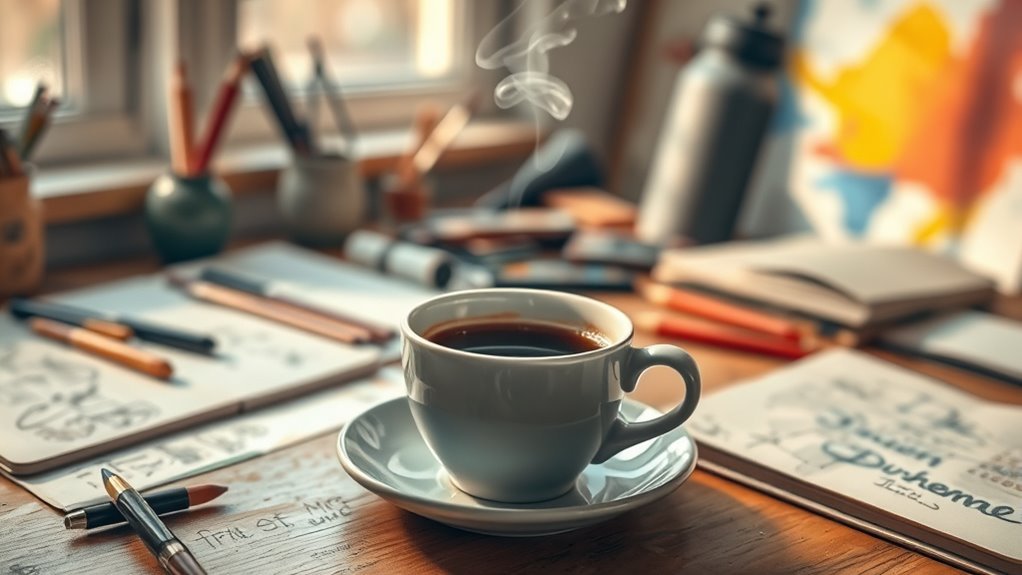The Impact of Coffee on Creativity and Inspiration
Coffee greatly impacts creativity and inspiration by enhancing cognitive function and mood. It boosts dopamine and norepinephrine levels, fostering alertness and idea generation. The aroma and flavors can elevate your spirits, making you more open to new concepts. Additionally, the ritual of coffee preparation can create a productive mindset, aiding focus. However, balance is key; too much coffee can hinder creativity. To uncover the nuances behind these effects, you’ll want to explore further insights on this topic.
The Science of Caffeine and Brain Function

Although you might enjoy your morning cup of coffee for its rich flavor, the real magic lies in caffeine’s complex interaction with brain function. When you consume caffeine, it undergoes rapid metabolism, primarily in the liver, where enzymes break it down into various metabolites. This process influences how effectively caffeine enhances neurotransmitter release, particularly dopamine and norepinephrine. Increased levels of these neurotransmitters can lead to heightened alertness and improved cognitive function. Additionally, caffeine competes with adenosine, a neurotransmitter that promotes sleepiness, thereby blocking its effects. This dual action not only boosts energy but also sharpens focus, enabling you to think more creatively. Understanding these mechanisms can help you harness caffeine’s potential to foster mental clarity and freedom in your creative endeavors.
Coffee and Mood Enhancement
As you sip your coffee, you might not realize how considerably it can influence your mood. Research shows that coffee flavors, from robust dark roasts to light fruity blends, can evoke distinct mood associations. The aroma of coffee stimulates the brain’s pleasure centers, releasing dopamine, which enhances feelings of happiness and motivation. Additionally, caffeine’s psychoactive properties can lead to increased alertness, reducing feelings of fatigue or stress. This combination not only uplifts your spirits but can also spark creative thinking. A simple cup can transform your outlook, making you more open to fresh ideas. Whether you prefer a smooth latte or a bold espresso, the right coffee can empower your emotional state and fuel your creative journey.
Focus and Concentration: The Coffee Effect

When you consume coffee, you might notice a boost in mental alertness, which can enhance your ability to focus on tasks. Research shows that caffeine stimulates the central nervous system, leading to improved concentration and engagement in activities. This effect can be particularly beneficial for complex problem-solving and creative tasks, where sustained attention is essential.
Enhanced Mental Alertness
While many people rely on coffee to kickstart their day, its impact on mental alertness—particularly focus and concentration—has garnered substantial attention in scientific research. Caffeine, the primary stimulant in coffee, can enhance cognitive performance, especially when you’re feeling sluggish. Research indicates that individuals with lower caffeine tolerance often experience a more pronounced boost in focus after consuming coffee. However, the variety of coffee consumed also plays a role; lighter roasts tend to have higher caffeine content, potentially maximizing alertness. It’s crucial to note that while coffee can sharpen your concentration, excessive intake may lead to diminishing returns as tolerance builds. Ultimately, finding the right balance can help you harness coffee’s benefits for enhanced mental clarity and productivity.
Increased Task Engagement
Coffee not only boosts mental alertness but also greatly enhances task engagement, making it easier for you to immerse yourself in complex activities. Research shows that caffeine increases dopamine levels, promoting motivation and focus, which leads to deeper task immersion. When you consume coffee, you’re likely to experience heightened concentration, allowing you to tackle challenging projects with clarity. However, it’s essential to be mindful of caffeine dependency; relying too heavily on coffee can lead to diminished returns, where the initial boost fades, making it harder to engage without a cup in hand. Ultimately, enjoying coffee in moderation can foster creativity and productivity, empowering you to explore and excel in your pursuits while maintaining control over your caffeine habits.
Creative Thinking and Problem Solving
When you consume coffee, its caffeine content enhances brain function by increasing dopamine levels, which can lead to improved creative thinking and problem-solving abilities. This heightened state of focus not only helps you enter a productive flow but also stimulates innovative ideas, making it easier to tackle complex challenges. Research suggests that moderate coffee intake may considerably boost your cognitive flexibility, allowing for greater adaptability in your thought processes.
Coffee and Brain Function
Although many people enjoy coffee for its rich flavor and aroma, its impact on brain function—particularly in creative thinking and problem solving—has garnered significant attention in scientific studies. Research indicates that caffeine, a key component of coffee, enhances cognitive performance by improving alertness and stimulating the release of neurotransmitters like dopamine. This stimulation can lead to heightened creativity, enabling you to connect disparate ideas and approach problems from new angles. Additionally, coffee benefits include increased mental flexibility, which is essential for innovative thinking. However, the effects can vary based on individual tolerance and consumption levels. Ultimately, when enjoyed in moderation, coffee can serve as a powerful tool in your quest for creative insights and effective problem-solving.
Enhanced Focus and Flow
While many factors contribute to enhanced focus and flow during creative tasks, caffeine’s ability to fine-tune attention plays a pivotal role. By improving alertness, coffee helps you tap into creative bursts and maintain productivity peaks. Research shows that caffeine can increase dopamine levels, thereby enhancing your mood and motivation, essential for problem-solving.
| Aspect | Effect of Caffeine |
|---|---|
| Attention | Sharpens focus on tasks |
| Creativity | Stimulates innovative thought |
| Mood | Boosts positivity and energy |
| Problem-solving | Encourages effective solutions |
Incorporating coffee into your routine can optimize your creative process, ensuring you engage with your work more deeply and effectively.
Stimulating Innovative Ideas
As you sip your coffee, the stimulant not only boosts your energy but also fosters an environment conducive to innovative thinking and problem-solving. Your coffee rituals can serve as a catalyst for creative boosts, revealing new perspectives and ideas. Studies show that caffeine enhances cognitive flexibility, allowing you to approach challenges with a fresh mindset.
Consider these aspects:
- Enhanced Idea Generation: Coffee can help reveal thoughts that are otherwise stifled.
- Improved Mood: A positive emotion can lead to more innovative solutions.
- Increased Collaboration: Sharing a cup can inspire teamwork and collective brainstorming.
- Heightened Focus: Caffeine sharpens your focus, making it easier to connect disparate concepts.
Embrace your coffee ritual for a creative edge!
The Ritual of Coffee in the Creative Process
When you engage in the ritual of making coffee, you’re not just preparing a beverage; you’re initiating a process that can greatly enhance your creativity. These coffee rituals serve as creative habits that signal your brain to shift into a productive mode. The act of brewing becomes a meditative experience, allowing your thoughts to flow freely.
| Element | Impact on Creativity |
|---|---|
| Preparation | Focus on the task at hand |
| Aroma | Stimulates brain activity |
| Taste | Enhances enjoyment and focus |
| Routine | Creates a sense of structure |
| Break | Provides necessary mental rest |
Historical Perspectives: Artists and Their Coffee Habits

Throughout history, countless artists have turned to coffee as both a stimulant and a source of inspiration in their creative endeavors. The influence of coffee on the artistic process is undeniable, shaping drink preferences and rituals across cultures. Here are some notable historical artists and their coffee habits:
- Voltaire – Consumed over 40 cups daily, fueling his prolific writing.
- Balzac – Used coffee to power through nights, relying on it for artistic inspiration.
- Beethoven – Carefully measured his coffee beans, believing it enhanced his creativity.
- Picasso – Found solace in coffee shops, where he connected with fellow artists in the caffeine culture.
These coffee consumption patterns reveal a deep connection between creative environments and artistic output, emphasizing coffee’s role as an essential source of inspiration.
The Role of Environment in Coffee Consumption
While many factors influence coffee consumption, the environment in which one enjoys this beverage greatly shapes not only the experience but also the creative output associated with it. A well-curated coffee ambiance can enhance your focus and stimulate innovative thoughts. For instance, natural light and pleasing workspace aesthetics often lead to increased productivity and creativity. Research indicates that environments with plants or artwork can reduce stress, allowing your mind to wander freely, which is essential for creative thinking. Additionally, the sounds around you—whether the gentle hum of a café or the quiet of a home office—can influence how you engage with your ideas. Ultimately, recognizing the importance of your surroundings when sipping coffee could reveal new levels of inspiration.
Alternatives to Coffee for Boosting Creativity

Finding the right environment for coffee consumption can significantly foster creativity, but it’s important to recognize that there are numerous alternatives to coffee that can also enhance your creative process. Consider these options:
- Herbal Teas: Chamomile or peppermint can promote relaxation and focus.
- Matcha Alternatives: This green tea powder provides a calm alertness without the jitters.
- Adaptogenic Mushrooms: Varieties like lion’s mane can support cognitive function and reduce stress.
- Cacao Beverages: Rich in antioxidants, they can elevate mood and spark inspiration.
Incorporating hydration strategies, mindfulness practices, outdoor walks, and even creative retreats can synergize with these alternatives, further releasing your creative potential. Embrace these options to discover what resonates with you and fuels your imagination.
Balancing Coffee Intake for Maximum Creativity
To harness the full potential of coffee for creativity, it’s crucial to strike a balance in your intake. Overconsumption can lead to increased caffeine tolerance, diminishing its stimulating effects. Aim for coffee moderation to guarantee you remain inspired without feeling jittery or anxious.
Here’s a simple guide to help you manage your coffee intake effectively:
| Coffee Intake | Creativity Level | Potential Risks | Tips for Balance |
|---|---|---|---|
| 1 cup/day | Ideal | Minimal | Stick to morning hours |
| 2-3 cups/day | Moderate | Anxiety, jitteriness | Add water or milk |
| 4 cups/day | Diminished | Increased tolerance | Take breaks |
| 5+ cups/day | Low | Health issues | Consider alternatives |
Finding your perfect balance can elevate your creative output considerably.
Frequently Asked Questions
Can Decaf Coffee Still Enhance Creativity and Inspiration?
Studies show that around 20% of coffee drinkers opt for decaf, highlighting a growing trend. Decaf can still offer benefits, like providing a comforting ritual without the jitters associated with caffeine. While it may not deliver the same immediate boost, many find that the act of sipping decaf fosters a relaxed state, encouraging creativity. Exploring caffeine alternatives, like herbal teas or matcha, could also enhance your inspiration while maintaining that cozy coffee experience.
How Much Coffee Is Too Much for Creativity?
When it comes to how much coffee is too much for creativity, it’s all about finding your creativity balance. Generally, consuming up to 400 mg of caffeine daily—about four cups of coffee—can enhance focus without overwhelming you. However, exceeding this can lead to jitters and decreased creativity. Remember, other caffeine sources like tea or energy drinks also count. Listening to your body’s cues is key to maintaining that creative spark without going overboard.
Does Coffee Impact Artistic Skills Differently Than Analytical Skills?
Have you ever wondered if your morning brew sharpens your artistic skills differently than your analytical thinking? Research shows that coffee can enhance focus and alertness, which might boost your analytical skills, but its effects on artistic expression are more complex. While caffeine can stimulate creative thinking, it may also lead to overthinking, stifling spontaneous ideas. Consequently, how you use coffee may determine whether it fuels your creativity or hinders it.
Are There Specific Coffee Types That Boost Creativity More Effectively?
When considering if specific coffee types can boost creativity, it’s essential to look at espresso effects and various brew methods. Espresso, with its concentrated caffeine content, may enhance focus and alertness, which can indirectly stimulate creative thinking. Methods like pour-over or French press provide different flavor profiles and caffeine levels, which can also influence your mental state. Experimenting with these options might help you discover what truly sparks your creative flow.
How Does Individual Tolerance to Caffeine Affect Creative Output?
Your individual tolerance to caffeine greatly shapes your creative output. If you’re highly sensitive, even small amounts can boost your creative flow, helping you think more freely and expansively. Conversely, if you’ve built a tolerance, you might need larger doses to achieve the same effect. This variance in caffeine sensitivity can lead to different experiences in creative processes, influencing how ideas are generated and refined during brainstorming sessions.






